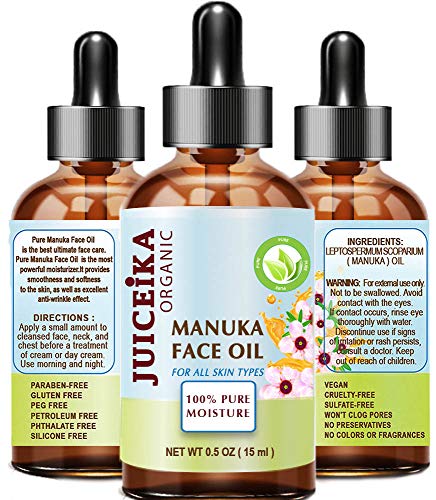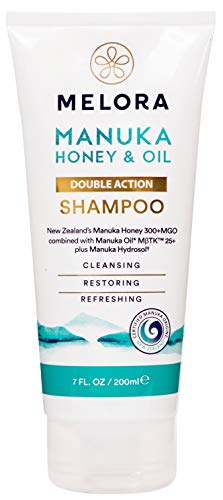Manuka essential oil is derived from the flowers of the Manuka tree. It has been used for centuries by the indigenous populations of New Zealand and Australia to heal skin diseases. However, manuka oil is also anti-inflammatory and has antifungal activity against Malassezia, making it a good natural remedy for seborrheic dermatitis and dandruff.
Let’s take a deep dive:
What is manuka oil?
Manuka oil comes from the manuka tree (leptospermum scoparium). Yes, it’s the same tree that gives us the nectar that bees use to make manuka honey. The oil is an ultra-concentrated essece of the plant that delivers the same Manuka benefits you know and love.
Unlike the honey, manuka oil is derived by steam distillation from the flowers, leaves and young stems of the manuka tree. A whopping 100 compounds have been identified so far in manuka oil, many of which have beneficial properties.
The manuka plant belongs to the same family as the tea tree plant. Tea tree oil is a potent antifungal agent and is commonly used as a natural remedy for seborrheic dermatitis. Go figure.
Benefits of manuka oil
Manuka oil is more expensive than many other essential oils but has a lot of benefits for the skin. Some of the benefits of manuka oil include its ability to improve wound healing, reduce inflammation, and treat acne. It is also anti-bacterial and anti-fungal, making it a great choice for treating seborrheic dermatitis.
The oil is also a great choice for aromatherapy. It has a spicy, herby-like fragrance that promotes relaxation and is often used during meditation.
Is manuka oil antifungal?
Lab studies show that manuka oil is a potent anti-bacterial agent and also has antifungal activity. The oil has been shown to be effective at inhibiting the growth of common fungi like Candida, Trichosporon and Malassezia. In fact, manuka oil is more effective at killing Malassezia than it is Candida.
Is manuka oil good for seborrheic dermatitis?
Manuka oil has a multitude of skin benefits like wound healing, improving skin barrier and treating acne. It has also been shown to have potent antifungal and antibacterial activity against common skin bacteria and fungi, particularly Malassezia. To top it off, manuka oil is also anti-inflammatory and can soothe the skin.
Even though human studies are lacking, this fragrant oil could be an effective natural remedy against seborrheic dermatitis and dandruff.
How to use manuka oil to treat seborrheic dermatitis
As with all essential oils, pure manuka oil needs to be diluted before use. You can mix a few drops of manuka oil in a carrier oil that is safe for seborrheic dermatitis. Make sure to avoid oils that can aggravate SD.
Using manuka oil on the face and neck
My favorite way to use manuka oil on the face is to mix a few drops with squalane oil (this is why squalane oil is good for seborrheic dermatitis) and massage it into my skin at night.
This is especially useful if you have dry skin and also in winter. If you find your skin too oily, use less product or mix the oil in with your favorite moisturizer instead. Alternatively, you can use it as an oil cleanse prior to your usual cleanser.
Using manuka oil on the scalp
For the scalp, I love mixing manuka oil with MCT oil for its antifungal properties. I hate the feel of a greasy scalp so I’ll only use oils as a pre-shampoo treatment. Warm up the oil before massaging it into your scalp for a luxurious experience. Rinse off after 10 to 15 minutes before shampooing as usual.
If you have a dry scalp, you can rub a few drops of oil into your scalp as a leave-in treatment. However, I find these scalp oils and serums are less greasy and more effective at treating flaky scalps.
This natural anti-dandruff shampoo contains both manuka honey and manuka oil for double action:
Ingesting manuka oil
Manuka oil is not manuka honey. It is not recommended that you ingest manuka oil in any way, shape or form.
Side effects of manuka oil
Diluted manuka oil is generally well tolerated but there are a few potential side effects to look out for. Common side effects include skin irritation, redness, dryness, and cracking. You may also get an allergic reaction to manuka oil.
Test manuka oil on a small area of your skin first before use.
Can manuka oil be used on babies?
There is not much information about how safe manuka oil is for babies. There is no evidence to indicate that it harms but I always err on the side of caution. I have never used manuka oil or any other essential oil on cradle cap for both my kids.
Even though essential oils are ‘natural’, it doesn’t mean it is any less potent. It has just as many potential side effects, if not more, as many commercial products.
If your infant has cradle cap, use jojoba oil or mineral oil instead.
Manuka oil vs manuka honey
Manuka oil derived from the steam distillation of foliage from the manuka tree while manuka honey comes from bees who feed off the nectar of manuka flowers. They are totally different products but have similar skin benefits.
In fact, it’s claimed that manuka oil is stronger than manuka honey when it comes to its antifungal, antibacterial and anti-inflammatory action.
Further reading: Is manuka honey good for seborrheic dermatitis?
To wrap up
Manuka oil is not as well-known as it’s uber popular cousin, tea tree oil. However, this amazing oil has many skin benefits and is worth trying if you are looking for a natural remedy for seborrheic dermatitis and dandruff.
 Check it out on Amazon
Check it out on Amazon Check it out on Amazon
Check it out on Amazon Check it out on Amazon
Check it out on Amazon Check it out on Amazon
Check it out on Amazon
Pingback: Best oils for seborrheic dermatitis
Pingback: Is manuka honey good for seborrheic dermatitis?
Pingback: seborrheic dermatitis treatment
Pingback: The 19 best essential oils for seborrheic dermatitis